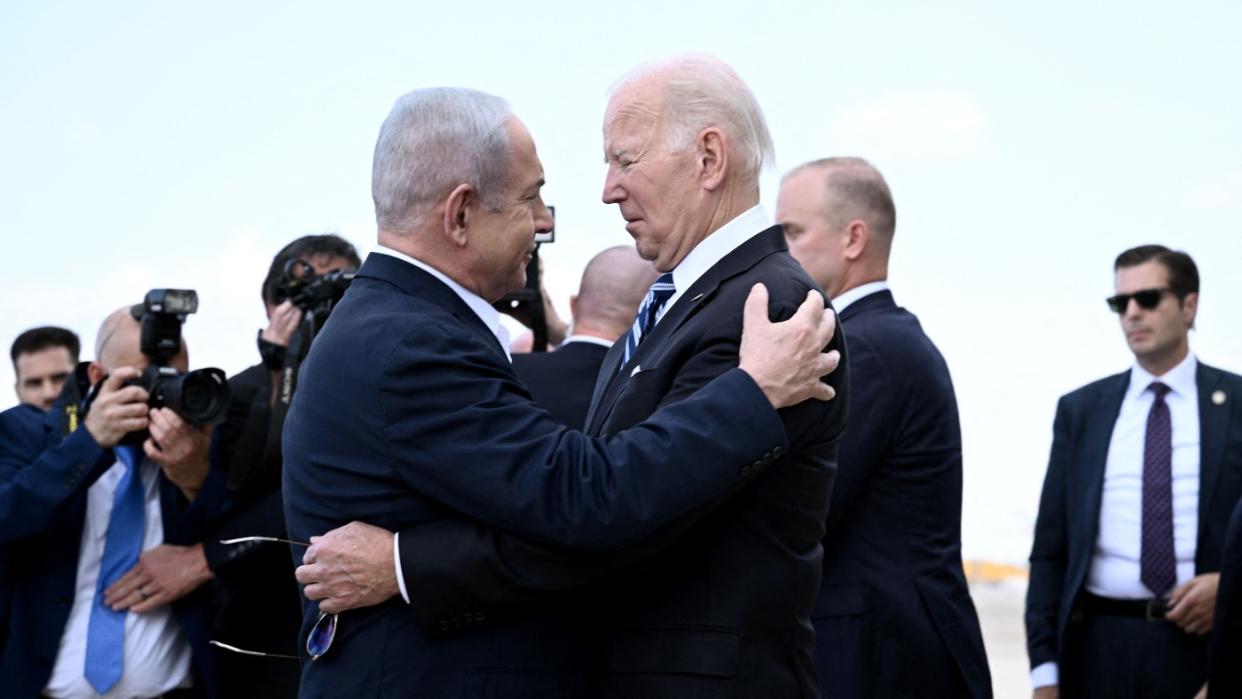Biden's Israel visit: what can US president achieve after Gaza hospital blast?

- Oops!Something went wrong.Please try again later.
- Oops!Something went wrong.Please try again later.
A deadly blast at a hospital in Gaza City has upended the diplomatic ambitions of president Joe Biden, who arrived in the Middle East today amid a flurry of last-minute meeting cancellations, finger-pointing and bitter recrimination.
Hamas blamed Israel for yesterday's explosion at Al-Ahli Arab Hospital in Gaza City, which is believed to have killed up to 500 people. Israel in turn said that the Palestinian Islamic Jihad militant group hit the hospital with a malfunctioning rocket.
In his first meeting of the trip, the US president told Israeli Prime Minister Benjamin Netanyahu that he was "outraged" by the explosion before adding: "Based on what I've seen, it appears as though it was done by the other team, not you. But there's a lot of people out there not sure, so we have to overcome a lot of things."
The visit "is a significant display of support for the Israelis", said Al Jazeera’s Alan Fisher, reporting from Tel Aviv. And "by asserting that a misfiring rocket caused the hospital carnage, Biden has effectively given Israel the green light to act as it sees fit", he added.
What did the papers say?
Late last night, Jordan cancelled a summit in Amman that Biden had been due to attend alongside the nation's King Abdullah II, the Egyptian president Abdel Fatah al-Sisi and Palestinian National Authority president Mahmoud Abbas. The meeting was axed just as Biden was about to take off on Air Force One heading for the region.
The US president's trip to the Middle East was always going to be a "high-stakes gamble", said the BBC. But now he is "flying into an even more volatile situation", after the explosion of the hospital in Gaza.
Biden "will have wanted to look like an honest broker dealing with both sides in the Middle East", the broadcaster said, but he "now faces the embarrassment of being told by the leaders of Jordan, Egypt and the Palestinian Authority that they have no confidence in his ability to end the violence".
The decision to cancel the summit in Amman "underscores a complex history between Jordan and Israel that stretches back to the very founding of the latter state and continues to influence regional dynamics", said Al Jazeera.
Since the two states signed a peace treaty in 1994, their relationship has continued to ebb and flow, hitting what Jordan's King Abdullah II called "an all-time low" in the late 2010s following a fatal incident at the Israeli Embassy in Jordan that led to the death of a Palestinian man.
Since then "relations appeared to have improved", Al Jazeera said, but now "Israel's war on Gaza could reverse that trend". Equally, a "failure to meet with Abbas or any Palestinian officials, and only holding talks with Israelis, may undermine Biden’s calls for a diplomatic solution, and give fuel to his critics", said The Guardian's Robert Tait in Washington.
What next?
The region has presented an intractable problem for numerous US presidents, said The Times in its leading article today. "Like it or not, America has returned to the Middle East imbroglio", the editorial board said, where "successive US governments have been bogged down in fruitless attempts to promote peace".
But the last-minute scrapping of the Amman meeting leaves Biden with "a new diplomatic headache", said CNN. At stake on the trip "are the lives of millions of civilians, including Americans, currently stuck in the coastal Palestinian enclave where a humanitarian crisis is under way as Israeli troops mass at its borders ahead of an expected ground invasion".
American officials "want humanitarian plans for Gaza fully signed off on and implemented before start of the invasion", which was "among Biden's main objectives" during his visit, the broadcaster added. Israel has since said it would allow basic humanitarian aid into the Gaza Strip from Egypt, but would not allow any humanitarian aid from its own territory until its hostages were returned by Hamas.
Biden's support of Israel is a tactical manoeuvre that he hopes may help minimise the fallout from the events of the past few weeks, said The Economist. "By embracing Israel, emotionally and politically, Biden hopes to have a greater ability to restrain its response, reduce civilian casualties and thereby limit the backlash in the Arab world and beyond."
The US president also wants to ensure that attention on the Middle East does not diminish his country's support for Ukraine in its war against Russia.
For now, he "remains confident that America can support its friends in both wars and beyond", The Economist said.
"We're the United States of America, for God's sake – the most powerful nation in the history of the world," Biden said recently in an interview with CBS News. "We can take care of both of these and still maintain our overall international defence."

